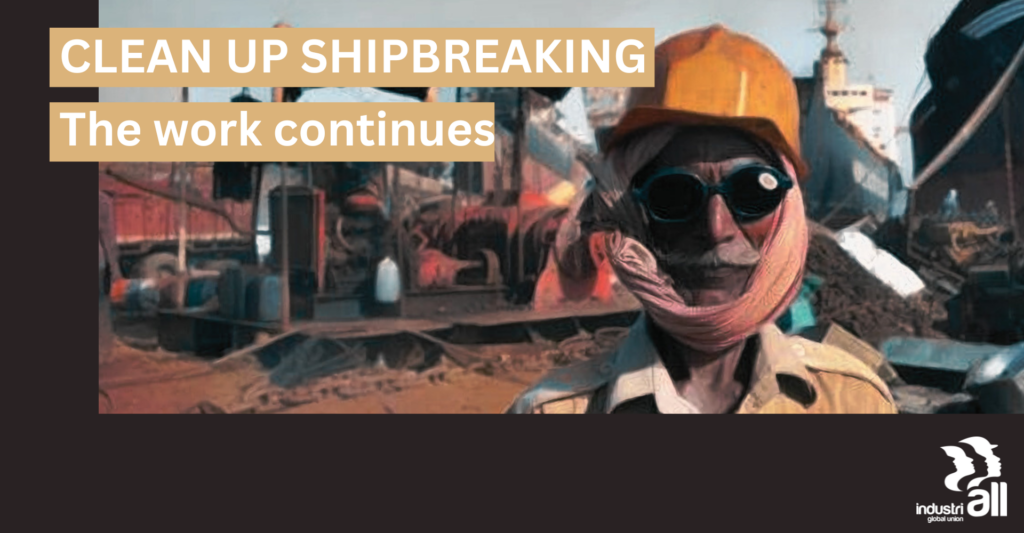27 February, 2024The Hong Kong Convention is an incredibly important step forward for workers’ human rights and environmental management. However, it is not enough to transform the industry, which will require sustained attention and activism by unions.
The politics of safety
The Ship Recycling Facility Plan requires a comprehensive health and safety training programme for all workers, and the creation of a safety officer and medical monitoring. However, years of bitter experience in other sectors has taught unions that a safety programme controlled by the employer, however well intentioned, is not enough. Shipyards are subject to commercial pressures, which means there is a conflict of interest in leaving employers in charge. A joint health and safety committee is the best solution.
The questions to ask are:
- Who is making decisions on safety?
- Who is trusted on safety?
- Who has power?
Workers may be confronted with conflicting instructions: safety procedures from the safety officer, and orders to get a job done quickly by a foreman. This creates confusion and can lead to accidents. Workers are also much more likely to trust and follow safety instructions that come from a union rep rather than an employer.
There are three fundamental safety rights that must be guaranteed in the workplace:
- The right to know about health and safety matters.
- The right to participate in decisions that affect health and safety.
- The right to refuse unsafe work, which is enshrined in ILO Convention 155.
The inadequacy of law
There is a risk that India, Pakistan and Bangladesh will fail to fully enforce the new laws covering ship recycling. There are reasons for concern in this area:
There are ten fundamental ILO Conventions that cover the world of work. Three are particularly important to shipbreaking.
- C87 – Freedom of Association and Protection of the Right to Organise Convention
- C98 – Right to Organise and Collective Bargaining Convention
- C155 – Occupational Safety and Health Convention
India has ratified none of these three Conventions. Pakistan and Bangladesh have ratified C87 and C98, but not C155. However, even when these countries have ratified Conventions and transposed them into domestic labour law, they have often failed to uphold them, either through a lack of enforcement capacity, or a lack of willingness to challenge powerful employers.
The ILO has a process during the International Labour Conference that considers cases of failing to uphold Conventions, called the Committee on the Application of Standards (CAS). IndustriALL, UNI and the ITUC brought a case to CAS against Bangladesh in 2017 for violations of freedom of association, including arbitrary arrest and detention of trade union leaders and activists, death threats and physical abuse while in detention, false criminal charges, surveillance, intimidation and interference in union activities, as well as mass dismissals of workers by garment factories following a peaceful protest.
While the case focused on the garment industry, it gives a worrying insight into the Bangladeshi’s government’s attitude to unions. In addition, in 2019, several workers’ organizations made a complaint under Article 26 for failure to observe Conventions 81, 87 and 98.
As a result of this complaint,, in July 2021 the ILO published a Road Map of actions, laying out in detail the steps the government needs to take to improve the situation. Three of the steps which will be particularly important to shipbreaking workers are:
- Simplification of trade union registration. In the past, registering a trade union in Bangladesh has been very complicated, and shipbreaking workers have been unable to register sector-wide unions, and have had to create numerous yard-based unions instead.
- Improving labour inspection and enforcement. Currently, if an employer breaks the law, there is very little opportunity for a worker to get remedy,
- Addressing anti-union discrimination and violence against workers. This will be done by providing training to employers, police and security guards.
Pakistan is another country where there are concerns about enforcement, due to the federal nature of the state, where decisions are devolved to provinces, and a weak labour inspectorate. After two workers were killed in the Gadani shipyards in January 2024, our affiliate the NTUF alleged that yard owners, government and police had colluded to cover up the incident.
The problem of asbestos
The HKC requires a proper disposal plan for asbestos, and some shipyards have started to build high quality facilities for processing this dangerous material. However, India, Bangladesh and Pakistan have not banned asbestos, and have helped block the inclusion of chrysotile asbestos in a list of banned substances in the Rotterdam Convention. Asbestos still has commercial value in these countries, where it is used in building materials.
Mechanisation and job losses
A concern for workers is that, as yards upgrade to meet HKC requirements, yard owners introduce mechanization and need fewer labourers. Jobs lost in shipbreaking yards could be offset by jobs created elsewhere if business and national governments invest in develop the downstream energy, for instance in plants that create green steel and in recycling centres.
Downstream workers
Another concern is that the HKC doesn’t make any provision for downstream workers, such as those working with scrap steel outside the yard gates, or the women processing ship waste.
